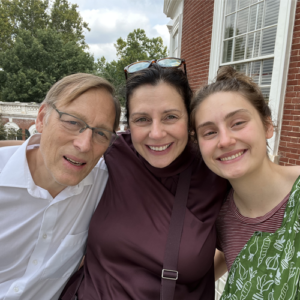
(left to right) Eric Hendrickson, Anja Bielinsky, and their daughter Annabelle
Professor Anja Katrin Bielinsky, PhD, was appointed the chair of the Department of Department of Biochemistry and Molecular Genetics on November 15, 2022. Professor Bielinsky came to us from the University of Minnesota, Twin Cities. An expert in DNA replication, Professor Bielinsky has authored a long list of peer-reviewed research publications that have shed light on how errors in DNA replication contribute to the development of cancer and other diseases.
Read our interview with Professor Bielinsky to learn what inspired her to become a basic science researcher, about her life and career, and more.
Q. Why did you choose the University of Virginia School of Medicine Department of Biochemistry and Molecular Genetics?
A. I was really intrigued by the high caliber of science and the focus on chromosome biology and cancer. The previous two chairs also studied DNA replication, so the department had been on my radar for a long time, not with the aspiration to become the chair, but because of the outstanding research.
Q. Why did you become an academic basic science researcher and choose your field of study?
A. I grew up in a family of small business entrepreneurs. My dad was a technical engineer, but my first exposure to science came in kindergarten. We had frequent visits to the Fuhlrott Museum, which has since been incorporated into the Neanderthal Museum. Dr. Johann Fuhlrott was an anthropologist in in my hometown, Wuppertal, Germany. He was the person who evaluated bones found at the nearby Neanderthal and suspected they were from a primitive human. At a young age, I loved paleontology. However, I credit my high school biology teacher, Dr. Grünewald, and his introduction into genetics, with piquing my interest in molecular biology. I started reading Scientific American and was fascinated by Cesar Milstein and George Koehler’s hybridoma technique for which they received the Nobel Prize in the mid-1980s. I thought that was the coolest thing I had ever heard and I told my parents that I wanted to study biology.
Q. What’s the most exciting thing happening in your field right now?
A. We study replication stress, which basically means that cells make an incomplete copy of their DNA. You have “pages” of information missing from your instruction book and it brings about the chaos of scrambled chromosomes that are a hallmark of many cancers. It took about 20 years to establish the relationship between replication abnormalities in rapidly dividing cells and genetic changes that drive the aggressive growth of malignant tumors. Today, we understand that defective DNA replication can only be tolerated when cells ramp up their ability to repair DNA damage. That presents a “vulnerability’ of cancer cells that can be therapeutically exploited.
Q. What are some goals you would like to achieve during your time at UVA SOM?
A. That’s simple. I want BMG to be a “happy place” for its members. My vision of a healthy and productive department is that everyone, staff, trainees and faculty work with purpose and with the understanding that they are part of something bigger. A team that supports each other through successes and setbacks. I hope to help create an environment where everybody can be their full selves, feels comfortable to voice their opinion and celebrates each other’s accomplishments.
Q. What’s your favorite part of your job or motivates you to get out of bed in the morning?
A. Basic research is full of surprises. For me, basic research and working with likeminded people trumps everything and is an enormous privilege. Basic research that is initiated by the simple quest of understanding a particular biochemical reaction, a structure of a protein and/or how multiple proteins orchestrate specific cellular tasks is instrumental to understanding human diseases or organismal development and ageing. Thirty years of basic research on RNA paved the way of making a COVID vaccine in a few months. Basic research on DNA replication and repair helps us to improve cancer treatments in countless clinical trials.
Q. What is one thing that may surprise people to learn about you?
A. I lived through the reunification of Germany in the early 1990s. It was an incredible experience that I didn’t appreciate at the time. I remember the nuances of the politics and debates. My mom fled East Germany about 6 weeks before the wall was built in 1961, with her brother and mom, but many friends were left behind. Nobody thought that the wall would ever come down. And then it did in 1989. It was the result of peaceful demonstrations in East Germany that happened every Monday (and were televised) over months. And then on Nov. 9, 1989 a fortunate miscommunication of a new travel policy “opened” the wall in Berlin and other places. It was amazing. This history has had a profound impact on shaping my personal values.
Q. If you could give your younger self one piece of advice, what would it be?
A. I was trained in a system that was often disrespectful to trainees and bullying was tolerated everywhere. I wish I would have rejected those measures sooner and had more confidence in myself. Don’t let others define your work or your value. Hold yourself accountable.
Q. How do you spend your time away from work? Hobbies?
A. We have horses, I love being around them. You can develop a true partnership with them. I have been lucky to have that; it has enriched my life. I started running during the pandemic and love the annual 10-mile run from Minneapolis to St. Paul.
Q. How would you describe yourself in one word?
A. True to myself (that’s three words).
Q. Who is your inspiration or hero?
A. Everybody who sees value in serving others.
Filed Under: Faculty
